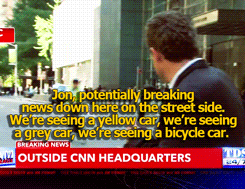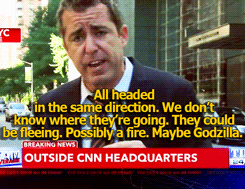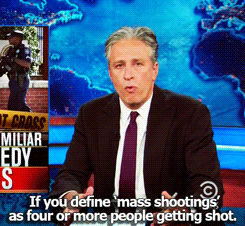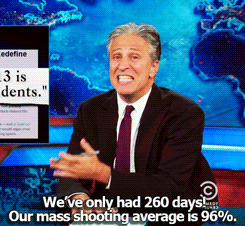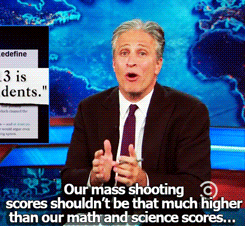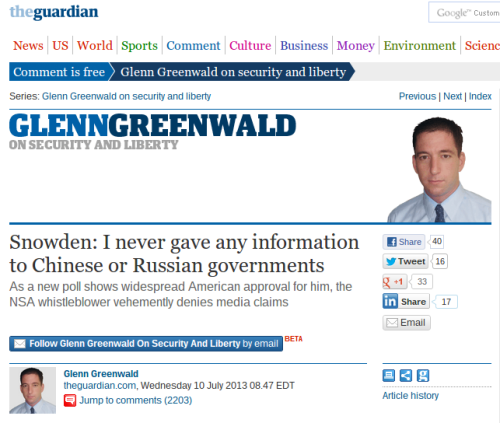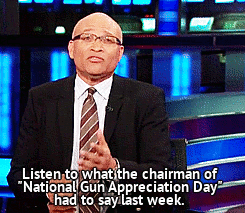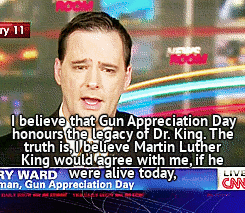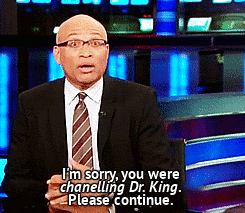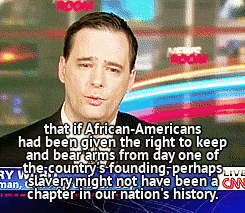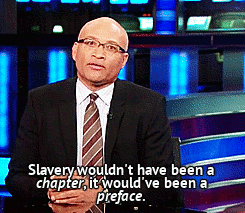Someone with laughtrack experience should do this full time as a service to America. I find Fox News totally unwatchable (sometimes it appears at a restaurant, a bank, waiting rooms, etc. and it is so uncomfortable I actually do not like to go back to these places and don't when possible). I usually watch opposing viewpoints that I need to learn about... but learning how Fox News works in its propaganda is downright impossible. It is like watching Faces of Death... but... with a soundtrack... well ... have a look see....
Tuesday, November 12, 2013
Thursday, October 10, 2013
Tuesday, September 24, 2013
Friday, September 20, 2013
Wednesday, September 18, 2013
Wednesday, September 11, 2013
The Search for a Unified Theory of Being a Mark
There was a moment in the history of science when everyone was trying to come up with a unification theory of light. Light had both the properties of a wave and a particle. The unification theory of light turned out to be rather simple: light was both a wave and a particle depending on how you looked at it. Some well known names came up with various parts of this theoretical solution like Max Planck, Niels Boehr, Erwin Schrödinger, Werner Heisenberg, and, of course, Albert Einstein. There was a massive change here. Quantum physics was born, but it is still known as theoretical. This is because, well, it is only through a maze of mathematics that these invisible things can be determined, in what is called "quantum theory."
Having said all this, I have no clue about it. My father was always trying to explain how electrons were going through a wire to light a vacuum tube with a filament or a light bulb. This confused me to no end as a young boy. Where do all the extra electrons go at the end and why doesn't the beginning run out of them? I have since come to terms with things like that. Matter and it's relationship to energy is a tricky thing. But it is so abstract I find it fairly useless in my day to day life.
I realized later in life also that I have always searched for unifying theories of my own. I don't know if the reason was in the structure of the education system, of society, or the uniqueness of myself. However, I do have a very basic desire to find the theory that unifies everything in my life, or smaller components of life lacking that. I hate to think I am atypical in this matter, because it sounds a little flaky. Sometimes I think of it as a hobby, This quells the fear that I am some kind of oddity. Absolutely I know I will never understand everything. And I probably have no chance of understanding even one small area enough to truly unify it in my mind.
I became a librarian, which makes a lot of sense when you think about it. I will do more entries on some of the unification theories I have come up with.
For now, my question of last week was very practical "what is the unification theory of car purchases?" I wanted to buy a car last week and did. Long ago, about two purchases ago, I read everything there was to read, or that I could stomach reading, about doing it correctly so as to not get ripped. One theory I have about capitalism helped me in this and usually helps me. It is a deep rooted first postulate that leads to the proper mindset. This is the principle that everyone is trying to get money out of my pocket. It is simple, but so was making the decision that light behaved like both a wave and a particle and that we would naturally just have to live with that as our theory. And then, mathematics could continue. Assume X then the rest of the alphabet and hundreds of other symbols follow.
My capitalism theory makes logical sense. Profit is what everyone is after. No one denies that. So everyone must be trying to make as much profit as they can without causing too much disruption in the overall matrix. When I buy something, I am the easy mark they wish to take the money from. One corollary to this is that the larger the transaction is, the more people cheat-- at least on the seller side. Sometimes the government steps in with things like "lemon laws" in favor of the customer when the cheating gets so onerous that even our elected representatives take notice, i.e., too much disruption in the matrix. Of course we are in a phase of American history currently in which it is unlikely any representative would care at all to create something akin to the "lemon" legislation of the past.
A complete overhaul could be accomplished by simply legislating that car dealers must post the price of each car that each customer buys. We could easily then computerize the process of accessory add-ons, and other fake stuff. Most of this last part is already being done. But the key critical piece of information which we do not have, that leaves them dealing from a stacked deck, is the knowledge of the actual prices that all previous customers paid.
Prices do not vary in, say, a grocery store based on how the cashier sizes up a customer. They have their own tricks, of course, but nothing so radical as making you sit in a tiny room while they go see if the manager will accept your offer on chicken noodle soup. If we knew the prices other customers paid, just a tiny bit of information really because of how few cars are actually sold as opposed to cans of soup, it would seem to be relatively simple to only buy a car at the cheapest price the same car was sold to someone else. And I believe that would be an endgame for their biggest rip offs, leaving only the obvious rip offs everyone endures equally, which of course, is the basic concept of high profits in capitalism. The definition of a con game is more suited to what auto dealers actually do.
Of course this is not to say that all of car dealing is like this. There are other business models out there, but I would assume the vast amount of customers sit in that little room. I personally would have none of that. I walked into the showroom, only to be escorted back as if I were being given a gift of the chair I had left. I stood though, and folded my arms. Finally, I walked with my wife outside. You could feel the stares of all the car salesmen as I did this. As we neared a door, one asked calmly where we were going. (After all, they had my keys at that point but I'm sure not all of them knew this.) "Well, actually I thought I would look at the car more to take a closer look at what I was buying."
We were only down to the haggle over a trade-in. Before you say that trading in a car is stupid, I know already. Of course it is. I personally could not live with myself after even one experience at being a car salesman, so I trade in. But having to take a cut there, I do want top dollar on what I can get.
I had already researched the prices of what my car was worth (if you can trust rating agencies, which were the last people to trust in the financial biz before the big collapse). Armed with this information I was going to be paid top dollar for my car or I was walking. I don't have a unifying theory yet but I do have some rules of thumb that have worked in the past. Also, I know from past experience that the longer I spend dickering with these guys, the more upsetting the experience is and the longer I will feel buyer's remorse afterwards.
So they presented me with a price that was to include a bonus for my already well expressed reticence at buying the car (at what I must say was pretty much the price I was shooting for, but haggle is the name of the game.) That price they were going to offer for my trade-in was actually the lowest price I was willing to take that I had written down on a card. So basically, I had a price on the new car I found acceptable (based on my research at a car buying service that my bank offers me) and I had the lowest amount to the penny that I would accept for my trade in. It was really a done deal.
I said, "Well, I don't think that price is right for my car. Did you add the bonus in for my disliking [place various things I disliked here]?" "Yes." "Well, ok. If you will accept this price (I wrote down the amount of the highest price possible I had thought I might get for my car) then I will buy the car right now and I had no intention of buying a car today when I walked in."
Then the biggest game of all was played. He informed me I would have to sign on a line he drew on the piece of scrap paper with nothing but a bunch of figures scribbled on it. I had to sign before he could take the offer to his manager. I thought by now, he might think me intelligent enough not to pull this huge suckermatic gambit out of the bag, but he did. I have endured it twice before. So, obviously they were treating me as an easy mark, a shill, a pigeon. :)
This was not a contract. I should have gone ahead and signed it because it meant not a thing legally. It was going to be the way they held me to my offer. I had every intention of going through with my offer. But I really do have my pride sometimes. I told him I would not sign it because it was just a game. I told him my signature on a line with no contract above was meaningless. Still he insisted that I sign or he couldn't take it to his manager.
The whole process of having a manager unseen in an office and the guy talking to you in the little room is just startlingly easy to figure out, especially in small dealerships, if you just think of an overall "unifying theory" of ripping off customers. There is a famous scene in the movie Fargo about this. If you have not seen Fargo you should for a hundred different reasons. Also, if you are a car dealer, you have NEVER seen Fargo. I have asked enough of them to know that they have never seen Fargo under any circumstances. (I even asked two salesmen while making idle conversation that day, to add to my statistics)
The following is the most relevant scene but honestly I recommend the movie highly. It is steeped in atmosphere. Notice the wall of salespeople at the beginning of the clip. Notice the subtle elevator music. The setup is great.
The movie cuts the waiting period short from what it is in reality because the actual waiting period a customer has to withstand in the tiny room is interminable if done properly. I think you have to look antsy before they even consider coming back. Plus, I think there is a good chance the room is bugged.
So faced with this line on a paper with figures in no context that I had to sign, and knowing that signing it would make me more of a sucker-like person than I wanted to endure later in the buyer's remorse period, I said I would put my initials on the line for his manager. I said this is just as legal as my signature, because neither is a binding contract, especially initials without a signature. :)
He protested a bit and said his manager might not accept my offer. I said "Oh, he will accept my offer."
That's when we headed out to the car. After a time he came out and made a production of shaking my hand while saying "Congratulations you have just bought a car." God, what I had to endure! I said, "Well, you just go inside and I'll talk it over with my wife and decide whether I want to buy it." I told her I wanted to buy it and that this was the easiest decision imaginable because I really loved the car. I have bought quite a few cars by the old age I am now, and never have I loved the car. :)
My wife had the idea of making emotional faces of dismay, and indecision. We pretended to be saying, "I don't think so," etc. Then I walked in and told him that we would take the deal. Oddly, I had no buyer's remorse this time at all. I love the car!
[A British version of the Fargo scene, obviously a classic, with a further twist at the end.]
Having said all this, I have no clue about it. My father was always trying to explain how electrons were going through a wire to light a vacuum tube with a filament or a light bulb. This confused me to no end as a young boy. Where do all the extra electrons go at the end and why doesn't the beginning run out of them? I have since come to terms with things like that. Matter and it's relationship to energy is a tricky thing. But it is so abstract I find it fairly useless in my day to day life.
I realized later in life also that I have always searched for unifying theories of my own. I don't know if the reason was in the structure of the education system, of society, or the uniqueness of myself. However, I do have a very basic desire to find the theory that unifies everything in my life, or smaller components of life lacking that. I hate to think I am atypical in this matter, because it sounds a little flaky. Sometimes I think of it as a hobby, This quells the fear that I am some kind of oddity. Absolutely I know I will never understand everything. And I probably have no chance of understanding even one small area enough to truly unify it in my mind.
I became a librarian, which makes a lot of sense when you think about it. I will do more entries on some of the unification theories I have come up with.
For now, my question of last week was very practical "what is the unification theory of car purchases?" I wanted to buy a car last week and did. Long ago, about two purchases ago, I read everything there was to read, or that I could stomach reading, about doing it correctly so as to not get ripped. One theory I have about capitalism helped me in this and usually helps me. It is a deep rooted first postulate that leads to the proper mindset. This is the principle that everyone is trying to get money out of my pocket. It is simple, but so was making the decision that light behaved like both a wave and a particle and that we would naturally just have to live with that as our theory. And then, mathematics could continue. Assume X then the rest of the alphabet and hundreds of other symbols follow.
My capitalism theory makes logical sense. Profit is what everyone is after. No one denies that. So everyone must be trying to make as much profit as they can without causing too much disruption in the overall matrix. When I buy something, I am the easy mark they wish to take the money from. One corollary to this is that the larger the transaction is, the more people cheat-- at least on the seller side. Sometimes the government steps in with things like "lemon laws" in favor of the customer when the cheating gets so onerous that even our elected representatives take notice, i.e., too much disruption in the matrix. Of course we are in a phase of American history currently in which it is unlikely any representative would care at all to create something akin to the "lemon" legislation of the past.
A complete overhaul could be accomplished by simply legislating that car dealers must post the price of each car that each customer buys. We could easily then computerize the process of accessory add-ons, and other fake stuff. Most of this last part is already being done. But the key critical piece of information which we do not have, that leaves them dealing from a stacked deck, is the knowledge of the actual prices that all previous customers paid.
Prices do not vary in, say, a grocery store based on how the cashier sizes up a customer. They have their own tricks, of course, but nothing so radical as making you sit in a tiny room while they go see if the manager will accept your offer on chicken noodle soup. If we knew the prices other customers paid, just a tiny bit of information really because of how few cars are actually sold as opposed to cans of soup, it would seem to be relatively simple to only buy a car at the cheapest price the same car was sold to someone else. And I believe that would be an endgame for their biggest rip offs, leaving only the obvious rip offs everyone endures equally, which of course, is the basic concept of high profits in capitalism. The definition of a con game is more suited to what auto dealers actually do.
Of course this is not to say that all of car dealing is like this. There are other business models out there, but I would assume the vast amount of customers sit in that little room. I personally would have none of that. I walked into the showroom, only to be escorted back as if I were being given a gift of the chair I had left. I stood though, and folded my arms. Finally, I walked with my wife outside. You could feel the stares of all the car salesmen as I did this. As we neared a door, one asked calmly where we were going. (After all, they had my keys at that point but I'm sure not all of them knew this.) "Well, actually I thought I would look at the car more to take a closer look at what I was buying."
We were only down to the haggle over a trade-in. Before you say that trading in a car is stupid, I know already. Of course it is. I personally could not live with myself after even one experience at being a car salesman, so I trade in. But having to take a cut there, I do want top dollar on what I can get.
I had already researched the prices of what my car was worth (if you can trust rating agencies, which were the last people to trust in the financial biz before the big collapse). Armed with this information I was going to be paid top dollar for my car or I was walking. I don't have a unifying theory yet but I do have some rules of thumb that have worked in the past. Also, I know from past experience that the longer I spend dickering with these guys, the more upsetting the experience is and the longer I will feel buyer's remorse afterwards.
So they presented me with a price that was to include a bonus for my already well expressed reticence at buying the car (at what I must say was pretty much the price I was shooting for, but haggle is the name of the game.) That price they were going to offer for my trade-in was actually the lowest price I was willing to take that I had written down on a card. So basically, I had a price on the new car I found acceptable (based on my research at a car buying service that my bank offers me) and I had the lowest amount to the penny that I would accept for my trade in. It was really a done deal.
I said, "Well, I don't think that price is right for my car. Did you add the bonus in for my disliking [place various things I disliked here]?" "Yes." "Well, ok. If you will accept this price (I wrote down the amount of the highest price possible I had thought I might get for my car) then I will buy the car right now and I had no intention of buying a car today when I walked in."
Then the biggest game of all was played. He informed me I would have to sign on a line he drew on the piece of scrap paper with nothing but a bunch of figures scribbled on it. I had to sign before he could take the offer to his manager. I thought by now, he might think me intelligent enough not to pull this huge suckermatic gambit out of the bag, but he did. I have endured it twice before. So, obviously they were treating me as an easy mark, a shill, a pigeon. :)
This was not a contract. I should have gone ahead and signed it because it meant not a thing legally. It was going to be the way they held me to my offer. I had every intention of going through with my offer. But I really do have my pride sometimes. I told him I would not sign it because it was just a game. I told him my signature on a line with no contract above was meaningless. Still he insisted that I sign or he couldn't take it to his manager.
The whole process of having a manager unseen in an office and the guy talking to you in the little room is just startlingly easy to figure out, especially in small dealerships, if you just think of an overall "unifying theory" of ripping off customers. There is a famous scene in the movie Fargo about this. If you have not seen Fargo you should for a hundred different reasons. Also, if you are a car dealer, you have NEVER seen Fargo. I have asked enough of them to know that they have never seen Fargo under any circumstances. (I even asked two salesmen while making idle conversation that day, to add to my statistics)
The following is the most relevant scene but honestly I recommend the movie highly. It is steeped in atmosphere. Notice the wall of salespeople at the beginning of the clip. Notice the subtle elevator music. The setup is great.
The movie cuts the waiting period short from what it is in reality because the actual waiting period a customer has to withstand in the tiny room is interminable if done properly. I think you have to look antsy before they even consider coming back. Plus, I think there is a good chance the room is bugged.
So faced with this line on a paper with figures in no context that I had to sign, and knowing that signing it would make me more of a sucker-like person than I wanted to endure later in the buyer's remorse period, I said I would put my initials on the line for his manager. I said this is just as legal as my signature, because neither is a binding contract, especially initials without a signature. :)
He protested a bit and said his manager might not accept my offer. I said "Oh, he will accept my offer."
That's when we headed out to the car. After a time he came out and made a production of shaking my hand while saying "Congratulations you have just bought a car." God, what I had to endure! I said, "Well, you just go inside and I'll talk it over with my wife and decide whether I want to buy it." I told her I wanted to buy it and that this was the easiest decision imaginable because I really loved the car. I have bought quite a few cars by the old age I am now, and never have I loved the car. :)
My wife had the idea of making emotional faces of dismay, and indecision. We pretended to be saying, "I don't think so," etc. Then I walked in and told him that we would take the deal. Oddly, I had no buyer's remorse this time at all. I love the car!
[A British version of the Fargo scene, obviously a classic, with a further twist at the end.]
Monday, September 9, 2013
Copyright is not really natural
“It ended being a reflection on the loss of long-established rights when you buy an e-book. You make a copy of that book, but at eye-level, so that the result is not a stack of paper, but another e-book.” - Peter Purgathofer, author of the idea. link
I'm not sure what "eye level" has to do with anything. "Long-established rights" he said, hmmmm... as in "human rights"?
It is apparently illegal to use a program to remove code (the DRM) from a file. Or to put it another way, it is illegal to remove part of a file we may have purchased in entirety. So this guy creates a way of automating the process of taking pictures and changing those into text files. No copyright violation I guess. I can personally think of a few challenges I might make in court. And that is why he does nothing but proof of concept. Perhaps he has copyrighted his idea by doing so. Who knows?
"Digital rights" really are a kettle of fish. Technically, it must be that we own nothing but the "right" to read a file. We do not own the file. We, sort of, rent the file for a purposed usage, if that usage is of a type that is agreed upon by those leasing the file... I think.
"Copyright is sometimes called a "negative right", as it serves to prohibit certain people (e.g., readers, viewers, or listeners, and primarily publishers and would be publishers) from doing something they would otherwise be able to do, rather than permitting people (e.g., authors) to do something they would otherwise be unable to do." -Wikipedia
[ Well, that was irony... I mean, I think that was ok to copy and paste. There are lots of ins and outs to this idea, I guess.]
Libraries are, kind of, exempt from copyright law. The "free" dissemination of information leads to a more educated populace... doesn't it? Yet... if everybody used only the library for reading... well... why would authors write books in a capitalist system of reward?
What would Ayn Rand think of her books being in libraries?
Did I have an original thought in there somewhere? This sentence and previous sentences, except those
I borrowed, are: Copyright 2013 © Michael DeVore.
Usage of the name "Ayn Rand" is "Copyright © 1995–2013 Ayn Rand® Institute".
I love that ® by her name. I always have. I'm glad I got the chance to point it out. :)
Saturday, August 31, 2013
Friday, August 23, 2013
It's All Understood (especially when you don't understand)
"It's All Understood"
Everyone laughed at her joke
As if they'd never even heard it before
And maybe they were truly amused
But every word that she spoke was a bore
And maybe it's because they had seen
The previews on the TV screen
Well this part is good and that's well understood
So you should laugh if you know what I mean
But it's all relative
Even if you don't understand
Well it's all understood
Especially when you don't understand
Then it's all just because
Even if we don't understand
Then lets all just believe
Everyone knows what went down
Because the news was spread all over town
And fact is only what you believe
And fact and fiction work as a team
It's almost always fiction in the end
That content begins to bend
When context is never the same
And it's all relative
Even if we don't understand
And that's well understood
Especially when we don't understand
Then it's all just because
Even if we don't understand
Then lets all just believe
I was reading a book
Or maybe it was a magazine
Suggestions on where to place faith
Suggestions on what to believe
But I read somewhere
That you've got to beware
You can't believe anything you read
But the good Book is good
And that's well understood
So don't even question
If you know what I mean
But it's all relative
Even if you don't understand
Well it's all understood
Especially when you don't understand
And it's all just because
Even if we don't understand
Then lets all just believe
But there you go once again
You missed the point and then you point
Your fingers at me
And say that I said not to believe
I believe
I guess
I guess it's all relative
As if they'd never even heard it before
And maybe they were truly amused
But every word that she spoke was a bore
And maybe it's because they had seen
The previews on the TV screen
Well this part is good and that's well understood
So you should laugh if you know what I mean
But it's all relative
Even if you don't understand
Well it's all understood
Especially when you don't understand
Then it's all just because
Even if we don't understand
Then lets all just believe
Everyone knows what went down
Because the news was spread all over town
And fact is only what you believe
And fact and fiction work as a team
It's almost always fiction in the end
That content begins to bend
When context is never the same
And it's all relative
Even if we don't understand
And that's well understood
Especially when we don't understand
Then it's all just because
Even if we don't understand
Then lets all just believe
I was reading a book
Or maybe it was a magazine
Suggestions on where to place faith
Suggestions on what to believe
But I read somewhere
That you've got to beware
You can't believe anything you read
But the good Book is good
And that's well understood
So don't even question
If you know what I mean
But it's all relative
Even if you don't understand
Well it's all understood
Especially when you don't understand
And it's all just because
Even if we don't understand
Then lets all just believe
But there you go once again
You missed the point and then you point
Your fingers at me
And say that I said not to believe
I believe
I guess
I guess it's all relative
Greenwald's Catch-22
I don’t want to argue the merits or demerits of the NSA ever, ever, ever again, and especially after any possible future terrorist attacks ( I GIVE UP ), but the above screen capture is still my favorite unintentionally funny headline from Glenn Greenwald on July 10th. The reason is not that Snowden now resides in Russia but because of Greenwald's and Snowden's logic flaw... similar to Clevinger's logic flaw in dealing with the apparently crazy Yossarian in the WWII classic Catch-22:
“They’re trying to kill me,” Yossarian told him calmly.
"No one’s trying to kill you," Clevinger cried.
"Then why are they shooting at me?" Yossarian asked.
"They’re shooting at everyone," Clevinger answered. "They’re trying to kill everyone."
"And what difference does that make?”
― Joseph Heller, Catch 22
[Edit 11/20/2015: this graphic is now mysteriously missing. :) I think it might have been a screen capture that included one of the following graphics. I actually know which one but I want to see if it disappears again. :) The irony may well be lost now but I was thinking at the time that if you give the documents to everyone, then you gave them to China and Russia. ]
Tuesday, August 20, 2013
Wednesday, August 14, 2013
3 = 6
I have so little time to write blog entries these days. But I have been reading quite a bit. So there is bad and there is good.
I just did a series of entries in my "Sandwich of Truth" blog on politics. They really belonged here but I chose to do them there because I have radical ideas, apparently, on surveillance and protection from terrorists. They have to be taken with a grain of salt, because I am making this stuff up from whole wheat, er cloth.
The fact that everyone on the left disagrees with me about Snowden is no biggie, well, at least personally, because tornadoes whiz by all the time around here and I really am oblivious to that danger as well. I still believe the chances that anyone would actually learn anything of substance from my phone calls and/or from my email, or my blog, for that matter, to be rather small indeed. And if they did, well, what? This blog should prove the point. So what! It does not matter if you know what I am thinking, as long as you don't hit me. We do need to stop the government from hitting us. I'll agree with that.
Life is full of risks. Spies have always been around and, by the way, you should absolutely watch the cold war spy television series "The Americans." It is really outstanding.
My series of blog entries was only tangentially about Snowden. The problem for me as a citizen is more profound than any single controversial topic, I think. I learned about the problem in my winter of discontent in the year 2000. This was the year I started a website called DemocracyHeldHostage.com. It was one of my claims to fame. I later sold it. This was the year of the Gore v. Bush decision by the Supreme Court which basically said my vote counted nothing, in no way... just nothing at all.
Now I wasn't taken aback by the electoral college system, which I already knew nullified my vote fairly well in a red state. What I learned was that any state could cheat, or be incompetent, or whatever, and cast all of its votes for whoever, despite a majority not being in favor of it. A majority did not matter in the least. What mattered was power.
The only power in this case was pretty much in the Supreme Court. The Supreme Court was not chosen by me, not really. That was circular reasoning. If the Supreme Court decides who is the President and the President decides who is the Supreme Court, well, I for one, am lost spinning in the mist of paradox. I cannot see beyond it. I never was very comfortable with the Supreme Court deciding it had the power to interpret the Constitution in the first place. Marbury v. Madison was the decision that defined the lines between the executive and judicial branches. The court decided it was the "decider" of the Constitution, without any help from us. Thomas Jefferson, one of my heroes, disagreed. But hell, what did that matter? The court was all powerful here, deciding the limits of it's own power. Then later deciding the President.
Thomas said:
I agree with everything he just said... well except for that last part. He kinda wrote a bunch of stuff himself that was in the Constitution and he was overly proud of it. The Constitution making all the departments co-equal and co-sovereign sounds good in theory (especially in elementary school) but honestly, when it comes down to it in any disagreement, there is never equality or there would never be resolution. So that is a shambles of a system. This is common sense to me but, don't forget, I think radically.
I always placed my bet on democracy. I read about it early on. It is complicated and simple at the same time. The simple idea is that we would all get an equal vote and share equal power in deciding our future. The case where it gets complicated is in small groups. Let us say there are 2 people deciding. Do you see the problem with small groups? No majority is possible with two if they disagree. Add another person and you have 3 and there will probably be a decision on a strictly "yes or no" question. If it is a multiple choice question, well, 3 doesn't really work well either.
In a small group of 2, I daresay the solution would be in power. How well can one choke off the oxygen. of the other, say? So the smaller a group is, the less chance of some kind of good decision based on consensus. The larger the number of choices, the less also, chance of consensus. But we conveniently put up two presidential candidates to solve this problem. If you vote for a third party candidate, you vote against your views because your third party candidate has zero chance of winning and your vote is pulled from the other candidate who is closest to your way of thinking.
If you ask any right wing type worth their salt, they will tell you we are a republic, not a democracy. There are a couple of reasons they say this: A) it is essentially true, B) they are REPUBLICans not DEMOCRATs and they tend to think in simplistic terms. Many don't really understand the distinction, nor the form of our government because it is neither a republic nor a democracy. While all this stuff is really off the top of my head, with a direct quote from, say, Tom Jefferson, I have thought a long time about this. And we are neither a republic nor a democracy. You can safely look that up as well.
So, small groups do worse than large groups, as I have just gone on and on about. We would hope that with universal education (right wing types don't like that idea either) we would make a good decision when deciding upon things in larger numbers. "You can fool some of the people some of the time..." etc. In small groups, "some" of the people are all you have to fool. This makes sense. A couple of horrendously bad choices for the Supreme Court and you have just ruined the stew.
Maybe all would be well if the Supreme Court were chosen democratically. But, really, they have to be pretty smart folks and a citizen who doesn't understand the laws would be a detriment. So they are not chosen democratically. We let the President choose them which we choose democratically, right?
Well, no we don't. If that is not obvious to us after the 2000 election, we don't need to be voting anyway. There is the electoral college. Each state decides how their electoral votes will be apportioned "winner take all" or by representation of the actual vote. Most choose "winner take all." Each state can make it's own laws about who is allowed to vote. We have seen that recently as the Supreme Court struck down the central component of the Voting Rights Act of 1965. This will definitely come into play in 2016 and maybe before.
The fact that everyone seems to think that it is some kind of game to elect the President should alone give one pause. Swing states come into play or go out of play, and the candidates planes fly around ignoring pretty much everyone (like we were from a flooded New Orleans housing development or something) excepting the few states that seem to matter. It is all a football game with people calling time out to ice the field goal kicker or something. It is not inspiring.
I can guess the will of the people would probably be better represented if a system of election just counted each person's vote as a single vote and elected a person most of us agree on; while I find it hard to believe in a system that has never said my state of Alabama is important to the election. It is straightforward to me. My vote doesn't count. Thinking otherwise would just be illogical. It is hard enough to get me to see reason that my one vote might count only if there was a tie. I is but impossible to make me think that my vote will count when all of my vote, and possibly the votes of 49% counts for 0% of the electors who elect the President.
I used to fool myself into believing that it really did not matter because the electoral college would almost surely follow the national vote, just by reason or chance. I would never have guessed the vote could be for one person by half a million people and still come out wrong. Another way to put could be that everyone canceled everyone else's vote out and a half of a million people to zero would be the margin, yet we would go with the zero. So it would be as if we get 10 people in a room who say, we should do this, but we go with that. 10 people times 50,000, in actuality.
This was actually pretty important to me:
There was a graphic with the following I encountered on Facebook.
9 = 72
8 = 56
7 = 42
6 = 30
5 = 20
3 = ?
I remember the progression, so I could remember the numbers by memory. The answer is 3. Before you attempt to do any heavy thinking using patterns, I have to ask: has 3 ever equaled any other number that was not equal to 3? People think they are smart when they see the 4 is missing. 4 = 12 therefore 3 = 6. No, I'm sorry, you are not smart when 3 = 6, you are in a alternate universe. No matter how many false statements are asserted before the question of what 3 equals, the question has only one answer, IN THIS UNIVERSE.
Worse, when I explained it in every way I could think of, people said I should think outside of the box. I was not being creative. People made fun of me, they hounded me. I actually unfriended someone because of this dumb question. How idiotic could you be when someone has explained it to you and you still did not admit the possibility? I was dumbfounded. I see the series. I get the pattern, but 3 is not equal to 6. This is not worded as an intelligence test of what number comes next in the series, It does not create a hypothetical. "If" is not included in the wording to create some imaginary universe.
Why was this not funny to me? Why did I argue until I finally "unfriended" someone? 500,000 votes does not equal -1. It does not equal zero, but that is closer. And it does not equal 1 but is closer to 1 and that would be enough if there were a tie. Al Gore won by over 500,000 votes (using a one man, one vote system) but that was made equal to -1 or less.
If you can believe 3 = 6, well, you can believe anything.
Another way this can be stated is:
9 + 100,000 = 72
8 + 100,000 = 56
7 + 100,000 = 42
6 + 100,000 = 30
5 + 100,000 = 20
3 + 100,000 = x
I can think of two answers: x = 100,003 or x = the twenty-fourth letter in the ISO basic Latin alphabet, or in Roman numerals it represents 10.
X does not equal 6. Have I gone too far in explaining?
The presidential race is not democratic. The Supreme Court is not democratic, or even representational. Further, 2 senators per state does not equal fair representation. 2 senators represent all the people in California, and 2 senators equal all the people in Wyoming. Further, gerrymandering makes the House of Representatives non-representational. Further, there are bribes, gifts, deals and to hell with it....
I was taught "direct democracy" (or everyone voting on each issue) was a bad idea because the masses might be moved over a short period of time and the masses would vote for things based on their emotions rather than thought. Really? That does not describe our system every election day? I don't know, maybe people focus more when it seems important. But contrast this, where everything would get a vote, to our current methodology where politicians play politics to keep bills from even getting to a vote, all in the name of being re-elected by fooling enough of the people enough of the time.
It is a simple fact that no general election day voting behavior has any influence on who will be President or who will be on the Supreme Court in a non-swing state. Well, you never know. You might just spit out the car window on the way to the polls and hit a butterfly's wings...
I just did a series of entries in my "Sandwich of Truth" blog on politics. They really belonged here but I chose to do them there because I have radical ideas, apparently, on surveillance and protection from terrorists. They have to be taken with a grain of salt, because I am making this stuff up from whole wheat, er cloth.
The fact that everyone on the left disagrees with me about Snowden is no biggie, well, at least personally, because tornadoes whiz by all the time around here and I really am oblivious to that danger as well. I still believe the chances that anyone would actually learn anything of substance from my phone calls and/or from my email, or my blog, for that matter, to be rather small indeed. And if they did, well, what? This blog should prove the point. So what! It does not matter if you know what I am thinking, as long as you don't hit me. We do need to stop the government from hitting us. I'll agree with that.
Life is full of risks. Spies have always been around and, by the way, you should absolutely watch the cold war spy television series "The Americans." It is really outstanding.
My series of blog entries was only tangentially about Snowden. The problem for me as a citizen is more profound than any single controversial topic, I think. I learned about the problem in my winter of discontent in the year 2000. This was the year I started a website called DemocracyHeldHostage.com. It was one of my claims to fame. I later sold it. This was the year of the Gore v. Bush decision by the Supreme Court which basically said my vote counted nothing, in no way... just nothing at all.
Now I wasn't taken aback by the electoral college system, which I already knew nullified my vote fairly well in a red state. What I learned was that any state could cheat, or be incompetent, or whatever, and cast all of its votes for whoever, despite a majority not being in favor of it. A majority did not matter in the least. What mattered was power.
The only power in this case was pretty much in the Supreme Court. The Supreme Court was not chosen by me, not really. That was circular reasoning. If the Supreme Court decides who is the President and the President decides who is the Supreme Court, well, I for one, am lost spinning in the mist of paradox. I cannot see beyond it. I never was very comfortable with the Supreme Court deciding it had the power to interpret the Constitution in the first place. Marbury v. Madison was the decision that defined the lines between the executive and judicial branches. The court decided it was the "decider" of the Constitution, without any help from us. Thomas Jefferson, one of my heroes, disagreed. But hell, what did that matter? The court was all powerful here, deciding the limits of it's own power. Then later deciding the President.
Thomas said:
You seem to consider the judges as the ultimate arbiters of all constitutional questions; a very dangerous doctrine indeed, and one which would place us under the despotism of an oligarchy. Our judges are as honest as other men, and not more so. They have, with others, the same passions for party, for power, and the privilege of their corps.... Their power [is] the more dangerous as they are in office for life, and not responsible, as the other functionaries are, to the elective control. The Constitution has erected no such single tribunal, knowing that to whatever hands confided, with the corruptions of time and party, its members would become despots. It has more wisely made all the departments co-equal and co-sovereign within themselves.
I agree with everything he just said... well except for that last part. He kinda wrote a bunch of stuff himself that was in the Constitution and he was overly proud of it. The Constitution making all the departments co-equal and co-sovereign sounds good in theory (especially in elementary school) but honestly, when it comes down to it in any disagreement, there is never equality or there would never be resolution. So that is a shambles of a system. This is common sense to me but, don't forget, I think radically.
I always placed my bet on democracy. I read about it early on. It is complicated and simple at the same time. The simple idea is that we would all get an equal vote and share equal power in deciding our future. The case where it gets complicated is in small groups. Let us say there are 2 people deciding. Do you see the problem with small groups? No majority is possible with two if they disagree. Add another person and you have 3 and there will probably be a decision on a strictly "yes or no" question. If it is a multiple choice question, well, 3 doesn't really work well either.
In a small group of 2, I daresay the solution would be in power. How well can one choke off the oxygen. of the other, say? So the smaller a group is, the less chance of some kind of good decision based on consensus. The larger the number of choices, the less also, chance of consensus. But we conveniently put up two presidential candidates to solve this problem. If you vote for a third party candidate, you vote against your views because your third party candidate has zero chance of winning and your vote is pulled from the other candidate who is closest to your way of thinking.
If you ask any right wing type worth their salt, they will tell you we are a republic, not a democracy. There are a couple of reasons they say this: A) it is essentially true, B) they are REPUBLICans not DEMOCRATs and they tend to think in simplistic terms. Many don't really understand the distinction, nor the form of our government because it is neither a republic nor a democracy. While all this stuff is really off the top of my head, with a direct quote from, say, Tom Jefferson, I have thought a long time about this. And we are neither a republic nor a democracy. You can safely look that up as well.
So, small groups do worse than large groups, as I have just gone on and on about. We would hope that with universal education (right wing types don't like that idea either) we would make a good decision when deciding upon things in larger numbers. "You can fool some of the people some of the time..." etc. In small groups, "some" of the people are all you have to fool. This makes sense. A couple of horrendously bad choices for the Supreme Court and you have just ruined the stew.
Maybe all would be well if the Supreme Court were chosen democratically. But, really, they have to be pretty smart folks and a citizen who doesn't understand the laws would be a detriment. So they are not chosen democratically. We let the President choose them which we choose democratically, right?
Well, no we don't. If that is not obvious to us after the 2000 election, we don't need to be voting anyway. There is the electoral college. Each state decides how their electoral votes will be apportioned "winner take all" or by representation of the actual vote. Most choose "winner take all." Each state can make it's own laws about who is allowed to vote. We have seen that recently as the Supreme Court struck down the central component of the Voting Rights Act of 1965. This will definitely come into play in 2016 and maybe before.
The fact that everyone seems to think that it is some kind of game to elect the President should alone give one pause. Swing states come into play or go out of play, and the candidates planes fly around ignoring pretty much everyone (like we were from a flooded New Orleans housing development or something) excepting the few states that seem to matter. It is all a football game with people calling time out to ice the field goal kicker or something. It is not inspiring.
I can guess the will of the people would probably be better represented if a system of election just counted each person's vote as a single vote and elected a person most of us agree on; while I find it hard to believe in a system that has never said my state of Alabama is important to the election. It is straightforward to me. My vote doesn't count. Thinking otherwise would just be illogical. It is hard enough to get me to see reason that my one vote might count only if there was a tie. I is but impossible to make me think that my vote will count when all of my vote, and possibly the votes of 49% counts for 0% of the electors who elect the President.
I used to fool myself into believing that it really did not matter because the electoral college would almost surely follow the national vote, just by reason or chance. I would never have guessed the vote could be for one person by half a million people and still come out wrong. Another way to put could be that everyone canceled everyone else's vote out and a half of a million people to zero would be the margin, yet we would go with the zero. So it would be as if we get 10 people in a room who say, we should do this, but we go with that. 10 people times 50,000, in actuality.
This was actually pretty important to me:
There was a graphic with the following I encountered on Facebook.
9 = 72
8 = 56
7 = 42
6 = 30
5 = 20
3 = ?
I remember the progression, so I could remember the numbers by memory. The answer is 3. Before you attempt to do any heavy thinking using patterns, I have to ask: has 3 ever equaled any other number that was not equal to 3? People think they are smart when they see the 4 is missing. 4 = 12 therefore 3 = 6. No, I'm sorry, you are not smart when 3 = 6, you are in a alternate universe. No matter how many false statements are asserted before the question of what 3 equals, the question has only one answer, IN THIS UNIVERSE.
Worse, when I explained it in every way I could think of, people said I should think outside of the box. I was not being creative. People made fun of me, they hounded me. I actually unfriended someone because of this dumb question. How idiotic could you be when someone has explained it to you and you still did not admit the possibility? I was dumbfounded. I see the series. I get the pattern, but 3 is not equal to 6. This is not worded as an intelligence test of what number comes next in the series, It does not create a hypothetical. "If" is not included in the wording to create some imaginary universe.
Why was this not funny to me? Why did I argue until I finally "unfriended" someone? 500,000 votes does not equal -1. It does not equal zero, but that is closer. And it does not equal 1 but is closer to 1 and that would be enough if there were a tie. Al Gore won by over 500,000 votes (using a one man, one vote system) but that was made equal to -1 or less.
If you can believe 3 = 6, well, you can believe anything.
Another way this can be stated is:
9 + 100,000 = 72
8 + 100,000 = 56
7 + 100,000 = 42
6 + 100,000 = 30
5 + 100,000 = 20
3 + 100,000 = x
I can think of two answers: x = 100,003 or x = the twenty-fourth letter in the ISO basic Latin alphabet, or in Roman numerals it represents 10.
X does not equal 6. Have I gone too far in explaining?
The presidential race is not democratic. The Supreme Court is not democratic, or even representational. Further, 2 senators per state does not equal fair representation. 2 senators represent all the people in California, and 2 senators equal all the people in Wyoming. Further, gerrymandering makes the House of Representatives non-representational. Further, there are bribes, gifts, deals and to hell with it....
I was taught "direct democracy" (or everyone voting on each issue) was a bad idea because the masses might be moved over a short period of time and the masses would vote for things based on their emotions rather than thought. Really? That does not describe our system every election day? I don't know, maybe people focus more when it seems important. But contrast this, where everything would get a vote, to our current methodology where politicians play politics to keep bills from even getting to a vote, all in the name of being re-elected by fooling enough of the people enough of the time.
It is a simple fact that no general election day voting behavior has any influence on who will be President or who will be on the Supreme Court in a non-swing state. Well, you never know. You might just spit out the car window on the way to the polls and hit a butterfly's wings...
Sunday, July 28, 2013
Subscribe to:
Comments (Atom)















